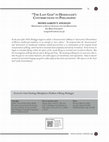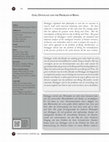Papers by Moses Aaron Angeles
Scientia - The International Journal on the Liberal Arts, Sep 29, 2023
Bedan Research Journal, Apr 30, 2022

Philippiniana Sacra
St. Bonaventure, an intellectual in the 13th century whose ideas are formed by Augustinian princi... more St. Bonaventure, an intellectual in the 13th century whose ideas are formed by Augustinian principles and whose Franciscan vocation defined his sanctity, is regarded as a mystic of first rank. Declared by Pope Leo XIII as the “Prince of Mystics,” his writings have influenced prominent spiritual writers across the ages. Considering these things, can we really consider St. Bonaventure a philosopher? Was he able to contribute something in the progress of the philosophical sciences? It is the purpose of this paper to lay out St. Bonaventure’s understanding of what philosophy is and how it is essentially grafted to faith, particularly to the Christian faith. My intention is fairly a simple one, to present the arguments of the Seraphic Doctor and offer a viable interpretation palatable in our own time. Indeed, it is my objective to prove that St. Bonaventure’s philosophy is a reflection of the mind’s progressive mental exercise leading towards the knowledge of God. It is not a cold philos...

Kritike: An Online Journal of Philosophy, 2009
ong Zi died carrying a disappointment in his heart. He searched in utter futility for a worthy in... more ong Zi died carrying a disappointment in his heart. He searched in utter futility for a worthy individual who embodies his moral ideal to be the Sovereign, the one who will be regarded as the "Son of Heaven." He traveled far and wide tirelessly looking for a man who will cure the ills of the society, who will assume in himself the moral ideal, and end the strife that divides the warring states of China. Unfortunately, he never found such a man. He may be disappointed of how things have become, however, he did not despair ultimately. On the contrary, he expressed his hope and aspiration by leaving us with competent disciples who are more than willing to share what they have learned and committed into writing what they have heard and witnessed from the Master. Kong Zi enjoys a universal appeal. He may have expressed his reflections as influenced by his own historical milieu, yet, his message is always fresh and not even an ounce of its luster vanished. Tonight, we do not simply celebrate the memory of the birth of China's eminent Master, but also try to reassess his reflections and how will it could be appropriated in our own situation. It cannot be denied that as a nation we are torn apart by a government ravaged by endless political rivalries. And because of this, we Filipinos lose our sense of what good governance is all about. We cannot anymore distinguish what is right and wrong, what is acceptable or not, what is good or bad, because we lose tract of a moral ideal. It is my hope this evening that we once again revive our idealism with Kong Zi as our guide. This paper will delve into the problem of Good Governance in the light of Kong Zi. What makes up a Just State? What are the elements that constitute a prosperous Kingdom? What principles of Confucianism can we employ to achieve a just and humane society? These are the primary questions that we will try to investigate as we go along. The paper will be thus divided into three essential parts: The Notion of Li and the Sovereign, The Confucian Moral Ideal, and lastly, The Great Commonwealth.

Scientia - The International Journal on the Liberal Arts
In the years after 1919, Heidegger began to call for a “deconstruction” (Abbau) or “destruction” ... more In the years after 1919, Heidegger began to call for a “deconstruction” (Abbau) or “destruction” (Destruktion) of Western intellectual traditions in an attempt to “save culture.” He proposed that the “deconstruction” and “destruction” of intellectual traditions should proceed from a re-examination of the original Greek interpretation of Being, which had been misunderstood completely and utterly trivialized. From hereon, he began to articulate Being within the sphere of the world; Being as unveiled and revealed in Dasein. But the investigation of Being did not stop in Being and Time. The meaning of Being lies in occurrence, that is, that the gods are not extant characters, but rather figures of remembrance and expectation. Only in dasein’s moment of existential longing can god be really empty of any claim and intention. This opens us to the “Last God” of the Contributions. References Dreyfus, Hubert and Mark Wrathall, eds. A Companion to Heidegger. Oxford: Blackwell, 2005. Ge...

Scientia - The International Journal on the Liberal Arts
Heidegger stipulated that philosophy as such has no warrant to concern itself with universal huma... more Heidegger stipulated that philosophy as such has no warrant to concern itself with universal humanity and culture. He then called for a reinterpretation of this task from the vantage point that has defined his greatest work, Being and Time. But the investigation of Being did not stop in Being and Time. The great achievement of Heidegger’s earlier philosophy, the profound and elaborate analysis of the ontological structure of human existence, of Dasein, was undertaken only in order to prepare the way for a more direct approach to the problem of Being. Furthermore, as Heidegger delved into the problem of Being the intensification of the presence of God in his works becomes all the more evident. References Clark, Timothy. Martin Heidegger. London: Routledge, 2001. Dreyfus, Hubert and Mark Wrathall, eds. A Companion to Heidegger. Oxford: Blackwell, 2005. Guignon, Charles, ed. The Cambridge Companion to Heidegger. Cambridge: Cambridge University Press, 1993. Heidegger, Martin. Basic Wri...
2 Immanuel Kant argues that the problem of God, together with the problems of Freedom and Immorta... more 2 Immanuel Kant argues that the problem of God, together with the problems of Freedom and Immortality, has been the constant preoccupation of the philosophers since time immemorial. God, he argues, is the conditioned unity of all categorical concepts and notions present in the idea of an absolute being. This he strongly argue because the mind, according to Kant, has a natural tendency to raise such problems. Such may be the case, but Kant neither wishes to eradicate nor attempts to disregard this tendency. Cf. Immanuel Kant, Critique of Pure Reason. N.K. Smith (tr.). (London: n.p., 1933), p. 39-45. 3 Friedrich Nietzsche, among many others, was the first one to attack seriously the claims of philosophy, theology, and religion about the existence and nature of God. In his critique of culture,
Philippiniana Sacra, 2009
Kritike: An Online Journal of Philosophy, 2008
Kritike: An Online Journal of Philosophy, 2009
... Title: Kong Zi on Good Governance. Author: Moses Aaron T. Angeles. Abstract: This paper will ... more ... Title: Kong Zi on Good Governance. Author: Moses Aaron T. Angeles. Abstract: This paper will delve into the problem of Good Governance in the light of Kong Zi. What makes up a Just State? What are the elements that constitute a prosperous Kingdom? ...











Uploads
Papers by Moses Aaron Angeles